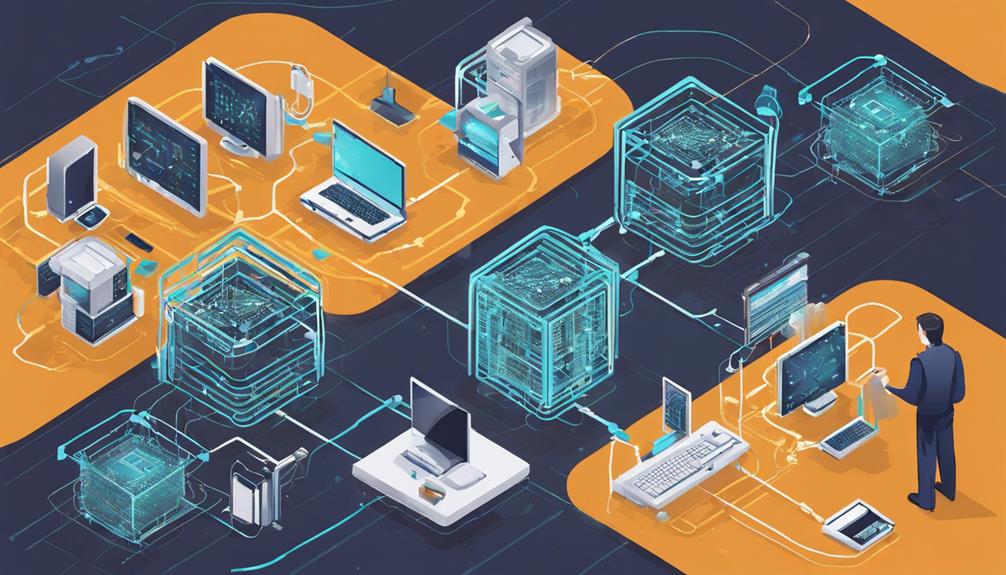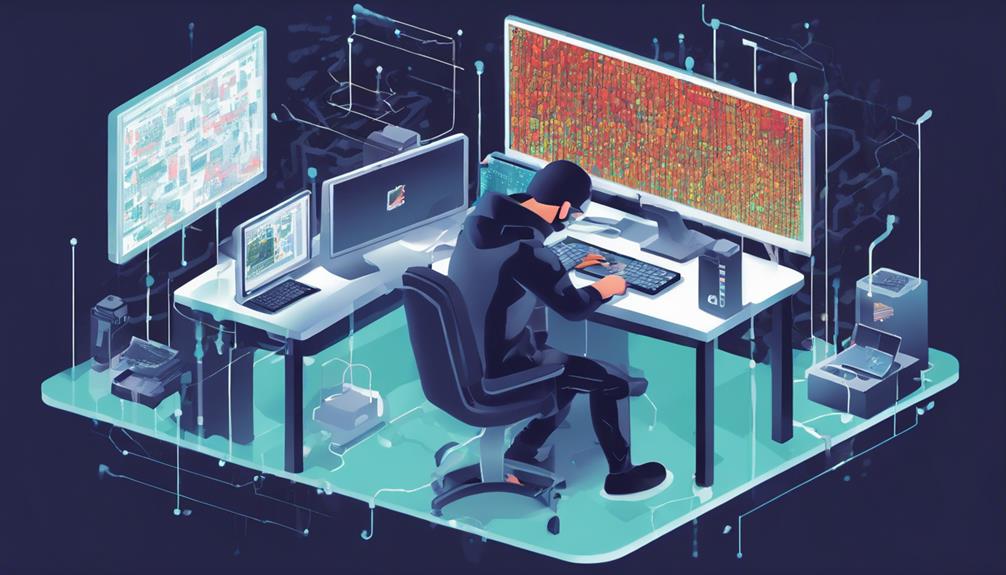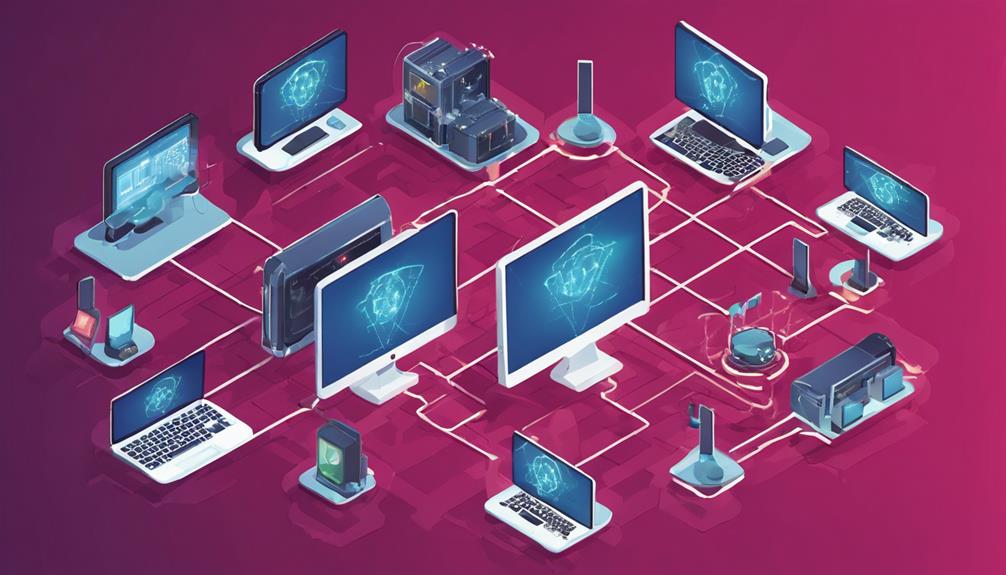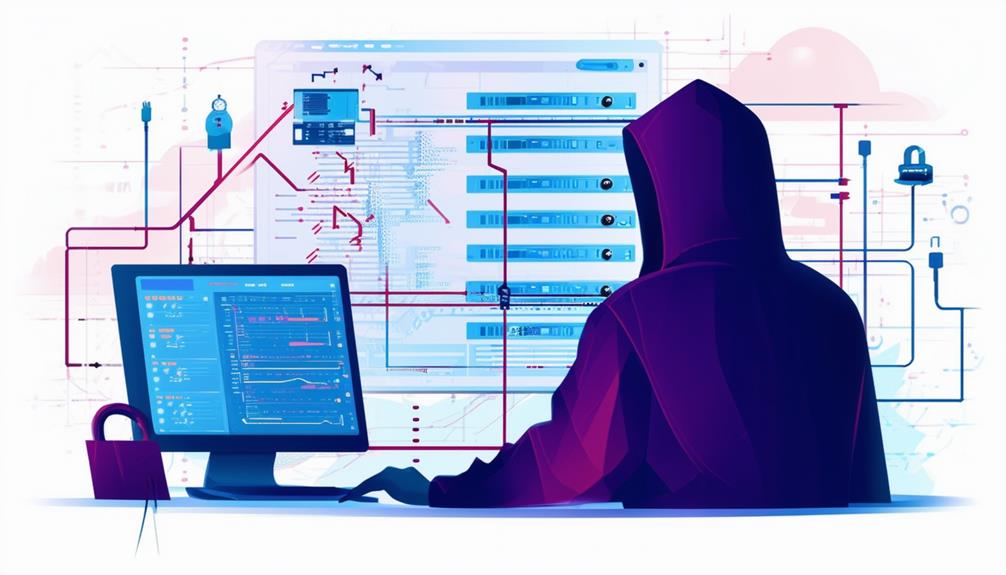Uncover vulnerabilities and boost network defenses with the 'Ethical Hacking: Scanning Networks Course'. Learn essential network scanning principles to identify weaknesses proactively. Utilize tools like Nmap for detailed insights into network exploration, Nikto for web application vulnerability checks, and Nessus for thorough security audits. Enhance anonymity with Proxychains and strengthen cybersecurity with understanding ethical hacking versus malicious hacking. Master firewall functions to monitor traffic and enforce security rules effectively. Gain practical skills to fortify defenses against cyber threats and stay ahead in the cybersecurity domain.
Key Takeaways
- Understand network scanning fundamentals for vulnerability assessment.
- Utilize tools like Nmap, Nikto, and Nessus for in-depth scanning.
- Implement privacy and security enhancements with Proxychains and Anonsurf.
- Differentiate between ethical hacking and malicious hacking practices.
- Strengthen defenses by leveraging firewalls to monitor and control network traffic.
Network Scanning Fundamentals
Understanding the core principles of network scanning is essential for effectively identifying vulnerabilities and enhancing overall network security. Scanning is a vital aspect of ethical hacking, where professionals simulate cyber attacks to uncover weaknesses that could be exploited by malicious actors.
By utilizing various scanning techniques such as port scanning and vulnerability scanning, ethical hackers can assess the security posture of a system and identify potential entry points for attacks. Network scanning allows for the detection of active hosts, open ports, and running services within a network, providing insights into areas that require heightened security measures.
Importance of Vulnerability Assessment

Conducting thorough vulnerability assessments is paramount for organizations looking to fortify their defenses against potential cyber threats. By performing vulnerability assessments, organizations can:
- Identify Weaknesses: Vulnerability assessment helps in pinpointing vulnerabilities in systems, applications, and networks that could be exploited by cyber attackers.
- Evaluate Security Risks: It enables organizations to assess potential security risks and threats, providing insights into areas that require immediate attention to prevent breaches.
- Enhance Network Security Posture: Regular vulnerability assessments play a vital role in proactively improving the overall network security posture, reducing the likelihood of successful cyberattacks.
Organizations use the results of vulnerability assessments to prioritize and address critical security issues effectively.
Nmap for Network Exploration

Nmap, a widely-used open-source tool, plays a pivotal role in network exploration for security purposes.
Understanding Nmap basics, various scanning techniques like TCP and UDP scans, and interpreting Nmap output are essential components of leveraging this tool effectively.
Nmap Basics Explained
Exploring network landscapes efficiently and effectively, Nmap serves as a versatile and powerful tool for network scanning and analysis.
When delving into Nmap basics, there are key points to understand:
- Thorough Network Scanning: Nmap is renowned for its ability to conduct thorough network scans, providing detailed insights into hosts, services, operating systems, and open ports within a network. This thorough view enables ethical hackers to identify potential vulnerabilities and strengthen network security.
- Varied Scanning Techniques: Nmap offers a range of scanning techniques, including TCP SYN scans, UDP scans, OS detection, and version detection. This variety allows users to tailor their scanning approach based on the specific requirements of the network, enhancing the efficiency and accuracy of the scanning process.
- Customization and Automation: With Nmap's scripting engine, users can customize scans, automate tasks, and develop advanced scripts to streamline network exploration. This level of customization empowers ethical hackers and network administrators to conduct in-depth analyses and efficiently address security concerns.
Nmap Scanning Techniques
Utilizing a variety of advanced scanning techniques, Nmap serves as a fundamental tool for thorough network exploration and analysis.
Nmap, a renowned network scanner, offers a range of scanning methods, including TCP connect scanning, SYN scanning, and UDP scanning. These techniques enable Nmap to identify open ports, services running on those ports, and even details about the operating systems of target systems.
By conducting network scans with Nmap, vulnerabilities in the network infrastructure can be uncovered, providing valuable insights for enhancing security measures.
Additionally, Nmap excels in host discovery and service version detection, allowing ethical hackers to investigate deeply into network devices and their configurations.
The flexibility and customization options within Nmap make it an indispensable asset for professionals engaged in network scanning activities.
With its ability to reveal critical information about network components, Nmap stands out as a powerful tool in the arsenal of ethical hackers aiming to secure networks against potential threats.
Nmap Output Interpretation
Interpreting Nmap output is vital for thoroughly evaluating network security and identifying potential vulnerabilities. When analyzing Nmap scan results, consider the following key points:
- Host Information:
Nmap provides detailed data on hosts within the network, including IP addresses and operating systems. Understanding this information is essential for evaluating the overall network structure and identifying potential entry points for attackers.
- Port States:
The output from Nmap includes information on port states such as open, closed, or filtered. By analyzing these port states, cybersecurity professionals can pinpoint potential vulnerabilities in the network that may be exploited by malicious actors.
- Service Details:
Nmap also reveals service details running on open ports, aiding in understanding the services available on each host. This insight enables security teams to determine if any services pose security risks and need further attention to mitigate potential threats effectively.
Understanding these aspects of Nmap output is critical for conducting thorough network security assessments and fortifying defenses against cyber threats.
Nikto for Web Application Scanning

Nikto, a robust web server scanner, conducts thorough assessments on web servers to uncover potential vulnerabilities that could compromise security. This tool is adept at identifying weaknesses in web applications by checking for dangerous files, outdated software, and other security issues that could be exploited by malicious actors. Nikto's detailed reports on the identified vulnerabilities play an essential role in strengthening web server security measures.
Ethical hackers widely favor Nikto for its effectiveness in pinpointing potential risks and enhancing the overall security posture of web servers. Being an open-source tool, Nikto is continuously updated to incorporate the latest security checks, ensuring that it remains a reliable option for conducting web application scans.
Leveraging Nessus for Security Audits

When considering thorough security audits, Nessus emerges as a formidable tool for identifying vulnerabilities and enhancing overall defense mechanisms within networks and systems. Utilizing Nessus for security audits offers several key advantages:
- Comprehensive Vulnerability Detection:
Nessus serves as a robust vulnerability scanner, capable of pinpointing known vulnerabilities, misconfigurations, and potential security weaknesses that may be exploited by malicious actors.
- Detailed Remediation Guidance:
The tool generates detailed reports following scans, outlining prioritized steps for remediation. This feature aids organizations in addressing identified vulnerabilities effectively and improving their overall security posture.
- Active and Passive Scanning Capabilities:
Nessus provides both active and passive scanning functionalities, enabling organizations to conduct thorough vulnerability assessments across their network infrastructure. This dual capability enhances the depth and accuracy of security audits conducted using Nessus.
Regularly incorporating Nessus into security audit practices empowers organizations to proactively identify and mitigate cybersecurity threats, bolstering their resilience against potential attacks.
Enhancing Anonymity With Proxychains

Improving anonymity through the use of Proxychains is a crucial aspect of securing network activities and safeguarding privacy online. Proxychains is a powerful tool that routes network traffic through multiple proxy servers, effectively concealing the user's IP address and location.
By integrating with tools like Anonsurf, users can add additional layers of anonymity and security to their online activities. Anonsurf enhances Proxychains' capabilities, further ensuring that malicious actors struggle to trace the user's digital footprint.
Additionally, MacChanger is a valuable tool that can change the MAC address of a network interface, adding another level of anonymity during network scanning processes.
When used together, Proxychains, Anonsurf, and MacChanger create a robust framework for enhancing privacy and security in network scanning activities. This holistic approach minimizes the risk of unauthorized access and data breaches, making it an essential practice for ethical hackers and cybersecurity professionals.
Hacking Vs Ethical Hacking Clarification

Ethical hacking involves authorized attempts to assess and strengthen system security, while hacking is unauthorized and typically malicious.
Understanding the differences between these practices is essential in the cybersecurity field.
Ethical hackers play an important role in identifying vulnerabilities and helping organizations secure their systems.
Hacking Misconceptions Clarified
Clarifying misconceptions between hacking and ethical hacking is essential for a thorough understanding of cybersecurity practices.
To differentiate between the two:
Ethical hacking:
- Authorized and legal practice.
- Aimed at improving network security.
- Ethical hackers have permission to identify and report vulnerabilities.
Hacking:
- Unauthorized and illegal activity.
- Carried out with malicious intent.
- Does not follow legal or moral guidelines.
Key Points:
- Ethical hacking is important for enhancing cybersecurity defenses.
- Understanding the distinction is essential in the cybersecurity field.
- Ethical hackers play a proactive role in mitigating network risks.
Ethical Hacking Principles Explained
Understanding the fundamental distinctions between hacking and ethical hacking is paramount in the field of cybersecurity. Ethical hacking, unlike hacking, is authorized and serves the purpose of enhancing system security.
While hacking is malicious and illegal, ethical hacking involves seeking permission to test systems for vulnerabilities with the intention of reporting and fixing them to strengthen defenses. Ethical hackers play a vital role in helping organizations prevent cyberattacks by proactively identifying weaknesses in their networks through methods like network scanning.
Strengthening Security With Firewalls

How can organizations enhance their network security measures effectively? Implementing firewalls is a key strategy in safeguarding against cyber threats and unauthorized access.
Here are three ways firewalls strengthen network security:
- Monitoring and Control:
Firewalls monitor network traffic and enforce security rules to prevent unauthorized access. By acting as a barrier between trusted and untrusted networks, they enhance overall network security.
- Types of Firewalls:
There are various types of firewalls such as packet filtering, proxy, stateful inspection, and next-generation firewalls, each offering different functionalities. Understanding these types is essential in developing a robust security strategy.
- Hardware vs. Software-Based Firewalls:
Firewalls can be hardware-based or software-based. They provide a critical layer of defense in network security strategies, contributing to the protection of sensitive data and systems. Understanding how firewalls work is vital for organizations to effectively mitigate cyber threats and secure their networks.
Advancing Skills in Ethical Hacking

To excel in ethical hacking, practitioners must develop proficiency in advanced network scanning techniques. Network scanning involves systematically probing a network to identify active hosts, open ports, and potential vulnerabilities. Understanding the intricacies of port scanning, vulnerability scanning, and utilizing a variety of scanning tools is pivotal for enhancing cybersecurity measures.
Professionals in this field often pursue certifications like Certified Ethical Hacker (CEH) and Offensive Security Certified Professional (OSCP) to validate their expertise and credibility.
Continuous learning and staying abreast of evolving security trends are essential for advancing skills in ethical hacking. Engaging in activities like Capture The Flag competitions and hands-on projects allows practitioners to apply theoretical knowledge in practical scenarios, reinforcing their understanding of network scanning methodologies.
Frequently Asked Questions
What Is the Hardest Ethical Hacking Course?
The hardest ethical hacking course is Offensive Security Certified Expert (OSCE), renowned for its rigorous hands-on challenges. OSCE demands a profound grasp of exploit development, advanced penetration testing techniques, and intricate network security concepts.
What Is Scanning Networks in Ethical Hacking?
Scanning networks in ethical hacking entails systematically probing a network to identify active hosts, ports, and services. This practice aids in uncovering vulnerabilities and potential entry points for security enhancement. Various techniques and tools are employed for thorough network security assessments.
What Are the Three Types of Network Scanning Methods?
Network scanning methods include Port Scanning, which identifies open ports on systems, Vulnerability Scanning to detect software weaknesses, and Host Discovery to find active hosts. Each method serves a specific role in evaluating security vulnerabilities.
Is a Hacker Who Gains Access to Systems With a View to Fix the Identified Weaknesses?
Yes, a hacker who gains access to systems with the intention of fixing the identified weaknesses is known as an ethical hacker. They aim to enhance system security by identifying and addressing vulnerabilities before they can be exploited by malicious actors.
Conclusion
To sum up, ethical hacking is an essential skill in today's digital landscape. By mastering network scanning techniques and vulnerability assessment tools, individuals can identify and address weaknesses in systems to enhance overall security.
Remember, in the world of cybersecurity, knowledge is power. As the saying goes, 'knowledge is the key to accessing success.'
Keep learning, practicing, and honing your ethical hacking skills to stay ahead of potential threats.









